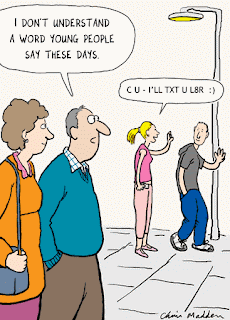I am currently writing a paper on the enregisterment of Internet language as deviating from Standard English, creating its own dialect, and even perhaps a pidgin. I am very excited about how it turned out, and I found some great research on the topic. But I also found a lot of biased research, and I am curious how no one figured out the faulty assumption under which they were operating.
A lot of the research of how texting and social networking has affected the written word nationwide was based on self analysis on the part of the researchers. The researchers are well educated people who typically speak and write in complete sentences. Does anyone see a problem here? It was no surprise that they found little to no problems when analyzing their own texts. For instance, Lauren Squires wrote an amazing article, “Enregistering Internet Language.” However, she bases a large part of her conclusion on her analysis of her own IM conversations. I can only assume that someone who writes as well as she does is not engaging in sub par language use.
For example, in my informal speech such as texts, or chat conversations, I tend to speak in complete sentences. I am aware I use ellipses a lot, but even in between all the dots I form coherent thoughts. For those of you who know me, you are aware that I end most texts with “…” This does not mean anything is to follow. No, I have ended the sentence there. I just, for whatever reason, trail off with a series of dots instead of a period. I also use “…” instead of commas. Again, for no particular reason. I like to think that that is my way of mimicking actual speech in which my voice slightly trails off as opposed to an abrupt stop. Who knows.
Regardless, I do not abbreviate words unnecessarily, do not use “u” instead of “you,” and I most certainly do not combine numbers and letters as if playing bingo with someone over the phone. However, other people do just that. So, if I were to conduct some sort of research on texting trends, I would in no way assume that analyzing my own would be indicative of the population at large.
In fact, one of my friends who teaches English constantly complains of how his students continuously insert these lovely texting habits into formal papers. He was tempted to fail a student just last semester (quarter?) for writing “u,” “b4” and other such nonsense into her final paper.
So when all these articles are telling me that the Internet and texting has not overall changed the way in which people communicate, I am a little suspicious. Especially when the researchers are telling me their sample group is themselves and ten of their closest friends, who also just happen to be well educated and coherent speakers of the English language. Hrm…

